
News |
- Toronto Seeks Enbridge Line 9 Environmental Assessment
- Release Bee-Death Studies
- UN Report - Right To Food
- Omnitrax Churchill Port Plan Dead On The Tracks
- B.C. Parks Open to Pipelines, Drilling
- Experimental Lakes Area Officially Saved
- 7 Million People Killed by Pollution
- IPCC 5th Climate Change Assessment Report
- Mi'kmaq Nations To Build Wind Farm
- Got Milkweed? Save the Monarchs
- Lake Winnipeg Exhibit Opens at Manitoba Museum
- April 1st is Fossil Fools Day
| Toronto Seeks Enbridge Line 9 Environmental Assessment | 11 April 14 |

The National Energy Board (NEB) has approved reversal of flow and increased capacity of the aging pipeline to 300,000 barrels a day (up from 240,000 barrels a day). The limited conditions the NEB attached to this approval allow Line 9 to be "safe and environmentally sensitive", with no thorough environmental assessment required. However, the 830-kilometer Line 9, now set to run from Sarnia ON to Montreal QC, passes through north Toronto and has become an issue for Toronto councilor Mike Layton, who initiated the motion for the environmental assessment. Toronto's expanding suburbs are now much more affected by Line 9 than when it was first constructed 38 years ago. Two similar motions put forth by Councilor David Shiner called for Enbridge to release more details about its plans with regards to emergency response and testing in the Toronto municipality. "People in our communities have a right to know where these pipelines are and any work proposed on them," Shiner said. Shiner stated he believes that the provincial government is avoiding the matter altogether, and is fully capable of conducting an environmental assessment. Nevertheless the Ontario government remains firm in its position that this issue is purely federal. "It would be up to the federal government to determine whether or not they would want to proceed with a federal environmental assessment," said Lyndsay Miller, spokesperson for Ontario Environment Minister Jim Bradley.
View April 3, 2014 The Star article Sources:
The Star, CBC
|
|
 Print version Print version |
Top |
| Release Bee-Death Studies | 4 April 14 |
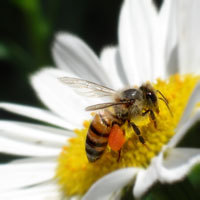
"Itís the beekeepers who are supplying the evidence (of toxicity)," Bennett told an Ottawa news conference Wednesday. But their dead bees are being ignored." Health Canada issued a report in September 2013 indicating detectable residues of neonicotinoid insecticides used to treat corn and soybean seeds were found in large numbers of dead bee samples taken in 2013. "Residues of neonicotinoid insecticides were detected in samples from approximately 80 per cent of the beekeepers for which samples have been analyzed." Sierra Club, the David Suzuki Foundation, Equiterre and the Wilderness Committee have sent a letter to Health Minister Rona Ambrose, calling on her to take action. They say pesticide makers should not be allowed to sell their products until the studies are provided.
View March 27, 2014 One News Page article |
|
 Print version Print version |
Top |
| UN Report - Right To Food | 4 April 14 |

The report, which has been six years in the making, calls for an outright dismantling of large scale agribusiness to give people a democratic voice in growing more locally based food. Despite promises of the 'green revolution' which was expected to feed more people through high yielding crops dependent on pesticides and chemical fertilizers, 800 million people around the world remain hungry. Although the report's recommendations are revolutionary, news of its release went largely unreported by major media outlets.
View April 2, 2014 viEUws article |
|
 Print version Print version |
Top |
| Omnitrax Churchill Port Plan Dead On The Tracks | 4 April 14 |

Oil from Alberta and the Bakken oilfields in North Dakota would be shipped north by rail and then either held at the port or loaded directly into waiting ships. "There are something like 350 water bodies within 10 metres of the track between The Pas and Churchill, so there is a tremendous risk of oil being spilled into the water, and it just won't be removed," said Eric Reder of the Wilderness Committee in Manitoba.
View March 28, 2014 Winnipeg Free Press article |
|
 Print version Print version |
Top |
| B.C. Parks Open to Pipelines, Drilling | 4 April 14 |
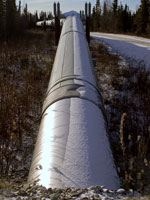
Canadian Parks and Wilderness Society's Peter Wood addressed the insidious nature of the Bill, stating, "There has been absolutely zero public consultation, and the pace at which this was pushed through suggests this was never a consideration." Andrew Gage, staff lawyer at West Coast Environmental Law, addressed the damage that something as inconspicuous as "preliminary research" for industrial developments could entail. As an example, the controversial Taseko Prosperity Mine's "research" consisted of the drilling of 59 test pits, eight drill holes 50 to 75 meters in depth, 10 holes around 250 meters in depth, along with roughly 23.5 kilometers of trails and roads. These activities being now legally allowed within 'protected' provincial park boundaries is something outraging BC residents. As Stephanie Goodwin of Greenpeace stated, "These changes are deeply unfair to the British Columbians who participated in the land use planning processes that established many of these parks. We call upon the BC government to cancel Bill 4 immediately and develop alternative legislation that will safeguard the integrity of our parks against industrial activity."
View March 30, 2014 The Globe and Mail article Source:
Vancity Buzz, DeSmog Canada, Huffington Post
|
|
 Print version Print version |
Top |
| Experimental Lakes Area Officially Saved | 4 April 14 |
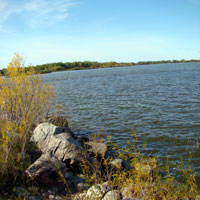
After nearly two years of campaigning to save the internationally acclaimed scientific research centre, scientists and civil society welcomed the IISD deal with relief. Since May 2012, individuals such as Diane Orihel, aquatic biologist at the ELA, have been fighting announcements of closure, and federal budget and job cuts resulting in the dismissal of the core group of 17 scientists. Although the new era of the ELA is greeted with optimism, there is some concern that the two-year hold on research at the ELA will have negatively impacted continuation of long-term studies (some as extensive as 40 years of continuous research). Additionally, challenges such as rebuilding the world-class but disbanded science team, and replacing research funds and grants, still remain to be addressed. As Scott Vaughan, president of the IISD, stated, "The Experimental Lakes Area has been directly responsible for literally hundreds of regulations around the world in order to safeguard water quality, to safeguard human health from different types of contaminants." The ELA is "the only whole-lake, whole-ecosystem facility in the world able to do this type of research."
View April 3, 2014 Winnipeg Free Press article Source:
The Globe and Mail, Winnipeg Free Press, CBC
|
|
 Print version Print version |
Top |
| 7 Million People Killed by Pollution | 4 April 14 |

The WHO stated that 90% of the estimated 3.7 million deaths caused by outdoor air pollution in 2012 were in developing countries. Also noted in WHO's report is that women and children living in poverty in developing countries are at higher risk for exposure to cancer-causing air pollutants due to their increased time breathing in smoke and soot indoors. WHO experts are saying that more research is needed to pinpoint the most dangerous components of pollution in order to mitigate and reduce their use and effects. Responsibility is being placed on governments to control pollution levels through action such as legislation, relocation of power stations away from highly populated cities, and cheap, accessible alternatives to outdated wood and coal burning stoves.
View March 25, 2014 Aljazeera article Source:
Aljazeera
|
|
 Print version Print version |
Top |
| IPCC 5th Climate Change Assessment Report | 28 March 14 |
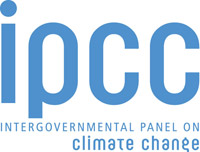
The first of the three reports was published in Stockholm, Sweden, in September 2013, and stated with 95% certainty that human activities were the cause of climate change on the planet. Although the Working Group 2 report is not yet officially published, major findings indicate the most severe and damaging effects of climate change will be felt in coastal equatorial Asian countries, where poverty, combined with close proximity to the rising sea levels will wreak havoc on the high densities of human population. The biggest culprits for causing climate change; countries such as the United Kingdom, Canada and the United States, will suffer less from our changing climate. Other complications predicted include reduced crop yields, more poverty traps, increased disease, worsened quality of living in crowded cities, slowed economic growth, an increase in forest fires, and bleaching of coral reefs.
View February 2014 Intergovernmental Panel on Climate Change report |
|
 Print version Print version |
Top |
| Mi'kmaq Nations To Build Wind Farm | 28 March 14 |
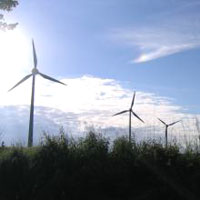
The Mesgi'g Ugju's'n wind farm is expected to begin operation at the end of 2016. Chief Claude Jeannotte, chairman of the Mi'gmawei Mawiomi said the project will be a significant contributor to the development of the three participating First Nations. "It will create wealth and jobs not only for our members, but also for our neighbours in Gaspesie and elsewhere in Quebec. We see great opportunities for the future," he stated in a release. Construction on the wind farm is scheduled to begin in 2015, after it receives certain pre-construction authorizations later this year. The environmental impact study has been submitted to the Quebec government and an information session was held last month. Negotiations are underway with potential turbine suppliers. View March 24, 2014 Stockhouse articleView March 24, 2014 The Gazette article View March 24, 2014 CBC News article View March 4, 2014 South Shore Now article View May 13, 2008 CBC News article |
|
 Print version Print version |
Top |
| Got Milkweed? Save the Monarchs | 28 March 14 |

We have the power to give the butterflies their breeding and feeding grounds back. The David Suzuki Foundation is launching the Toronto-based #Gotmilkweed campaign in April 2014, with the goal of creating a milkweed corridor right through the heart of downtown Toronto. This corridor, called the Homegrown National Park, will be located at numerous urban green spaces such as schoolyards and parks. It will encourage the return of this iconic butterfly with directly observable results, while raising public awareness of the monarch butterfly's situation. Manitobans can take their own initiative by buying and planting milkweed from local wild plant nurseries and catalogues, and join the movement to help monarch butterflies recover from their spiraling population decline. View March 24, 2014 David Suzuki Foundation articleView Prairie Originals report View Got Milkweed website View MonarchWatch Milkweed page Source:
David Suzuki Foundation
|
|
 Print version Print version |
Top |
| Lake Winnipeg Exhibit Opens at Manitoba Museum | 28 March 14 |

Although Manitobans are aware Lake Winnipeg is a very sick lake, the actual cause and process surrounding its declining health are less known and understood. This exhibit will simplify the complicated process of nutrient loading, known to scientists as eutrophication; highlight the sources of this problem (phosphorous leaching from farms, drainage channels, city effluent, etc.); and raise awareness in order to prevent and mitigate these negative effects. The centerpiece of this exhibit is an interactive touch-screen game that allows individuals to control what nutrient inflow goes into the lake. The simulation then demonstrates positive effects that come from these actions. This interactive experience is geared to children and adults alike. The aim is to inspire people to understand why Lake Winnipeg is experiencing environmental degradation, and to make their own choices and opinion on what steps must be taken to return Lake Winnipeg to health. 'Lake Winnipeg: Shared Solutions' opens Saturday, March 29 2014. View March 21, 2014 Winnipeg Free Press articleView March 21, 2014 Global Winnipeg article Watch March 21, 2014 Global Winnipeg coverage View Manitoba Museum Lake Winnipeg: Shared Solutions page Source:
Winnipeg Free Press
|
|
 Print version Print version |
Top |
| April 1st is Fossil Fools Day | 28 March 14 |

Climate change is being felt all across the globe, with sporadic and extreme weather patterns now occurring more frequently and more widespread. Scientifically proven evidence of how detrimental fossil fuel extraction is to the environment and changing climate is now publically recognized and acknowledged, and immeasurable spills, leaks, and explosions have proven how volatile and damaging this industry is. Despite all of this worrisome evidence, Canada's fossil fuel industry is going full steam ahead with countless proposed developments, expansions, and prospecting. Invasive industries such as fracking, oil pipelines, and bitumen extraction from fragile northern regions such as the Alberta tar sands and the Arctic must be openly and publically opposed, and stopped. Fossil Fools Day is a day to raise public awareness, show the industries and governments the power of the people, and put a stop to this foolish disregard for our Mother Earth. View Power Shift Fossil Fools pageView Fossil Fools Day Wikipedia page View Fossil Free Canada Fossil Fools Day page Source:
We Are PowerShift
|
|
 Print version Print version |
Top |


 RSS Feeds:
RSS Feeds: